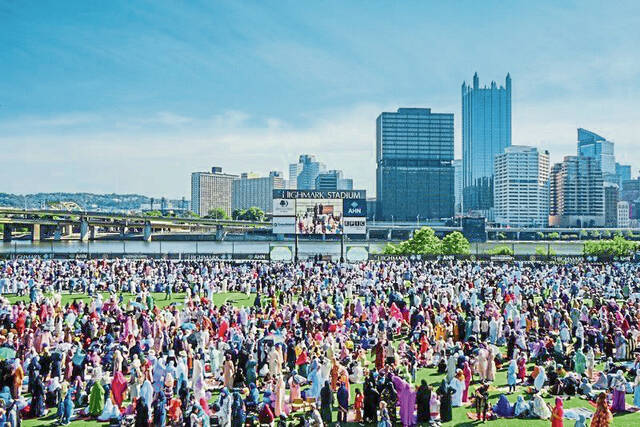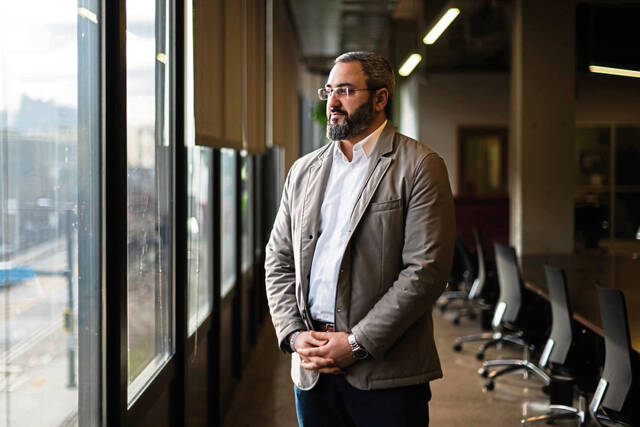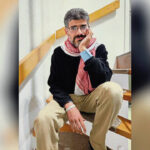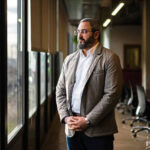One June morning, near 4 a.m. Pittsburgh time, Ahmed Arafat got a text from his sister in Palestine’s Gaza Strip.
It was 11 a.m. there. Israeli tanks were approaching Nuseirat, a refugee camp near where her family was sheltered.
“I’m going to die,” she texted Arafat. “Please take care of my daughter, if she survives.”
During the raid, the Israeli military rescued four hostages who had been kidnapped by Hamas one year ago today when the terrorist group attacked Israel. There were scores of casualties.
Israel put the death toll at a far lower number than the Hamas-controlled Health Ministry. But any number would have been too much for Arafat, a technology administrator in Churchill who emigrated from his native Gaza some 25 years ago.
Tragedy has enveloped his family since Oct. 7, 2023, when Israel started dropping bombs on Gaza after Hamas militants stormed southern Israel in a violent, surprise attack. Hamas killed 1,200 people, most of them civilians, and kidnapped and injured thousands more in the largest killing of Jews since the Holocaust.
Six days later, the Israel Defense Forces launched ground operations in Arafat’s homeland. A full-scale invasion followed.
Since then, there have been so many deaths Arafat has trouble keeping track of the details.
In May, bombs obliterated a four-story house in Rafah, a Palestinian city bordering Egypt, killing his aunt and her family. Arafat learned his cousins, with whom he played soccer growing up, planned to leave the building the next day.
In September, Arafat’s uncle died in Gaza.
“He had a health condition: He had diabetes, and there was no care,” said Arafat, 42.
“The sad part is we didn’t cry,” he said. “We were so upset when our families died in October and November. Now, it seems like they were the lucky ones — they didn’t have to live through 10, 12 months of this.”
As of Sept. 30, more than 41,000 Palestinians had been killed and nearly 100,000 injured in the war, Gaza’s health ministry reported to the United Nations.
“We’re talking about 41,000 people — 41,000 Ahmeds — every one of them had a father and a mother who loved them,” Arafat told TribLive recently. “We have to find a solution; we have to find peace. A person who is Palestinian, their life and their worth should be equal to the life of an Israeli — or to anyone else.”
Despite his fears about the raid on Nuseirat, Arafat got a rare piece of good news: He wouldn’t have to mourn yet another relative.
His sister had survived.
‘Living is worse’
Arafat has weathered the past 365 days by focusing and speaking publicly about a war that has coincided with eruptions of pro-Palestine protests nationwide and increases in Islamophobia.
In February, he traveled to Downtown Pittsburgh, where he joined more than 70 residents asking Allegheny County Council to pass a resolution supporting a ceasefire.
“We cannot change the past, but we can change the future,” Arafat told the crowd inside the Allegheny County Courthouse.
Weeks later, following a five-hour meeting, council voted no.
Arafat met with staffers from U.S. Rep Chris Deluzio’s office to push the Aspinwall Democrat to help funnel more humanitarian aid to Gaza.
Deluzio later supported a bill to distribute $9.2 billion to fund “essential life-saving aid” in Gaza, Haiti and elsewhere, according to his website.
Arafat said he feels tension between his desire to speak out about what’s happening in Gaza and his need to use restraint to help keep his family members safe and out of the public spotlight.
He is not alone.
Karim Alshurafa is another Pittsburgher who grew up in Gaza. Much of his family remains there, though he’s not always sure where they are living — or if.
Before the attacks of Oct. 7, 2023, he told TribLive, “I was just a regular guy who had a job in the steel industry, a guy at home with his kids.”
Now, he feels he and Arafat, who talk regularly by phone, are like spokesmen for Palestinian-Americans in the area who are afraid to share details of their tragedies.
“Ahmed and I, our entire lives have been turned upside-down,” said Alshurafa, 41, who lives in the North Hills and runs his own company. “I just feel a responsibility to do something. But I don’t know what we can do.”
Alshurafa’s cousin, who is living in Gaza, texts him often. The cousin’s 2-year-old daughter is dying of malnutrition, Alshurafa said.
“He wished he got hit by one of the bombs — living is worse,” he said. “People here are struggling with it. It’s called ‘survivor’s guilt.’ You say, ‘I could be there. And, instead, I’m here, enjoying a warm bed and a warm meal.’ ”
Safety concerns
Arafat said he prefers to tread carefully when it comes to discussing politics.
“It’s a touchy subject,” he told a TribLive reporter recently. “So, I’ll just stay off that.”
But sometimes he can’t resist sharing his opinion with the world.
This summer, Israeli army footage was posted online that appeared to show a dog attacking an elderly woman inside her home in Jabalia, northern Gaza.
“No words!” Arafat wrote.
Two months ago, an Indonesian man posted a video of two people, one of them a young girl, killed in an unknown location in what the man called “a new massacre launched by the occupation.”
“If we aren’t profoundly shaken by this, if we aren’t incensed by the fact that we’re funding this with our tax dollars, then we might as well abandon our moral compass altogether,” Arafat responded.
Arafat told TribLive recently he needs to be careful about what he says in public — and how many details he shares about family and friends in Gaza — due to safety concerns and increasing Islamophobia both locally and nationally.
Over the summer, some backers of a ballot question that sought to stop the City of Pittsburgh from doing business with companies that have ties to Israel were doxxed, their home addresses shared online, Arafat said. Fortunately, he said, he was not one of them.
The pro-Palestinian group behind the petition later conceded they lacked the signatures needed to get on the November ballot.
Nationally, incidents of anti-Muslim hate reported to the Council on American-Islamic Relations in Washington, D.C., hit a 30-year high.
The 8,000 complaints that came to the nonprofit, which advocates for Muslim civil rights, called the post-Oct. 7 spike in Islamophobia the biggest since then-presidential candidate Donald Trump proposed his “Muslim ban” on travelers from select countries in 2015.
Ripple effects
Arafat said he sees a change in Pittsburgh. He described an incident in which he said a truck driver forced his wife, who was wearing a keffiyeh, off the Parkway East while she was driving.
Arafat said an executive he knows outside of his job chided him over social media about Palestinian support for Hamas.
Arafat, who said he doesn’t believe in addressing problems through violence, feels frustrated that he must repeatedly explain he does not approve of the Hamas attack on Israel.
“Get rid of Hamas and your problems will be over,” he said the businessman told him.
Arafat didn’t respond. He simply deleted his connection to the man.
The ripple effects of the Israel-Hamas war have spread throughout the Pittsburgh region.
Last October, just after the attack, the Frick Art Museum indefinitely postponed an Islamic art exhibition. Museum Executive Director Elizabeth Barker cited concerns that it might have been hurtful to the Jewish community and others.
The decision was criticized by local Muslim and Jewish groups, and the museum reversed course a month later and rescheduled the exhibit.
It opened in August and runs through Oct. 20.
In February, U.S. Rep. Summer Lee, D-Swissvale, canceled a speech at a CAIR fundraiser amid mounting criticism over her participation from political opponents as well as from Jewish lawmakers like state Rep. Dan Frankel and Gov. Josh Shapiro.
Valuing life
Arafat takes comfort in attending weekly religious services at the Islamic Center of Pittsburgh, a fixture in the city’s Oakland neighborhood since 1989 and the city’s largest mosque.
He is one of about 20,000 residents in the Pittsburgh area who identify as Muslim, according to the Pew Research Center.
On June 16, thousands of local Muslims filled Highmark Stadium along the Monongahela River on Pittsburgh’s South Side to celebrate the holiday of Eid al-Adha.
The “Feast of Sacrifice” celebration was the first collaborative event that four of the area’s five main Islamic centers planned together.
The holiday marks the willingness of the Prophet Ibrahim — known as Abraham to Christians and Jews — to sacrifice his son. Among those who visited the stadium for Eid was Sarmad Ashfaq, a physician working to bring together Muslims from throughout the region.
“Obviously these are stressful geopolitical times, so having the community together is good,” said Ashfaq, 50, of Sewickley, a Pakistani-American who serves on the board of The Islamic Center of Western Pennsylvania in Pittsburgh’s North Hills.
In contrast to the jovial nature of the celebration, local pro-Palestinian protests that arose around the same time here and across the nation took on a more sober tone.
In March, Palestinian supporters gathered outside a federal building in Downtown Pittsburgh to protest pending Israeli military action in Rafah.
Protesters set up tents in Schenley Plaza near the University of Pittsburgh campus in April. They demanded Pitt divest itself from war-related investments in Israel.
One protest teetered on violence near Pitt’s Cathedral of Learning. Three men were arrested.
As the war in Gaza marks one year, Arafat stressed the importance of talking in human terms.
“I want nothing more than for Israeli children to be safe, but I want Palestinian children to be safe, too,” Arafat said.
“I am a father. I am a son. I am a husband. And I can tell you this: I value every single life,” he added. “All I dream is for Palestinian children to go to bed without worrying about being killed in their sleep.”
Correction: Ahmed Arafat said his wife was forced off the road as she drove on the Parkway East while wearing a keffiyeh. An earlier version of this story misidentifed the person who described the incident.













